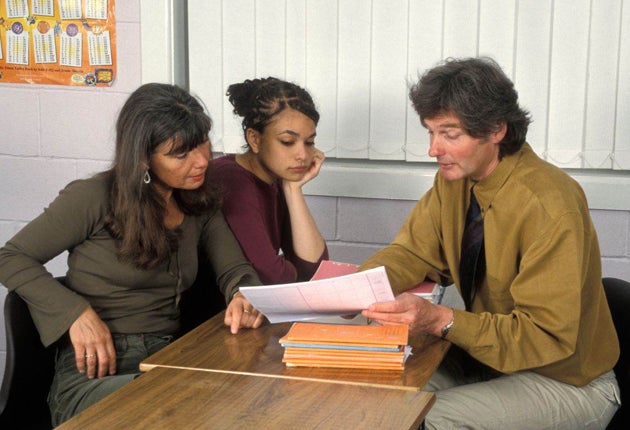Meet the parents: Schools are finding better ways to give pupil feedback than parents' evenings

Your support helps us to tell the story
From reproductive rights to climate change to Big Tech, The Independent is on the ground when the story is developing. Whether it's investigating the financials of Elon Musk's pro-Trump PAC or producing our latest documentary, 'The A Word', which shines a light on the American women fighting for reproductive rights, we know how important it is to parse out the facts from the messaging.
At such a critical moment in US history, we need reporters on the ground. Your donation allows us to keep sending journalists to speak to both sides of the story.
The Independent is trusted by Americans across the entire political spectrum. And unlike many other quality news outlets, we choose not to lock Americans out of our reporting and analysis with paywalls. We believe quality journalism should be available to everyone, paid for by those who can afford it.
Your support makes all the difference."Just how well do you actually know my son?" It was one of those parents' evenings where the weather was terrible, the traffic was worse, and the school's appointment system had dissolved into a scrum even if – as usual – only about half the parents had pitched up. Those who had looked as fed-up as most of the teachers felt. I know – I was one of them, a brand new one.
Facing the parents of a lad I had taught in a large class for two lessons a week for just a couple of months, it felt as if within a few minutes I was expected to come up with the magic formula that would suddenly make his grades improve – and I couldn't. After a long day at school and now at my first parents' evening ever, I could barely remember my own name, let alone his.
For some, parents' evening can seem more a poor version of speed dating than an attempt to sort out your child's life, with the time-consuming shuffling from queue to queue in a big hall or across a whole secondary school, the shortness of the appointments, and the challenge to learn something meaningful.
It does seem incongruous to have to queue and shuffle in this age of instant messaging and open access. So it's no wonder that an increasing number of schools, such as Sudbury Upper School and Arts College in Suffolk, have decided to address these problems by replacing parents' evenings with "student review days". On a student review day, the school closes for the whole day in order for pastoral tutors to spend 20 to 30 minutes with each student and their parents. At Sudbury, the tutor is the key link between school and home, as the students keep the same tutor from Years 7 to 11. According to head teacher David Forrest, the initiative came from the parents themselves: "Since we were criticised in an Ofsted report for not communicating enough with parents, we now often meet with parents to discuss what works and what doesn't, and about two years ago, parents felt that too much of their time in parents' evenings was spent in queues, leaving them with too little time to talk to the staff. So now, we have 80 per cent of parents and their children attending two review days in the year, compared to the 50 per cent who would come by themselves to a parents' evening and run out of time before they had seen all of their teachers."
There are, of course, downsides for the teachers, principally the massive effort needed behind the scenes to collect the data that enables the tutor to talk about each student in such an informed way. Yet such are the overall benefits in communication that the extra time is considered worth it.
"Although some parents now complain about a lack of access, subject teachers are always available on the phone, as most issues are better dealt with by a quick phone call," Forrest adds. "We invite those parents we want to see along to subject evenings once a year."
"Review days are much better than parents' evenings," parent Lynsey Benson says, "as we are not wasting time travelling between classrooms and teachers, and there is time to get good feedback. If any issue comes up there is also time to discuss it there or then, or it is easy to make a follow-up appointment if needed."
Dr Janine Spencer, director of the Centre for Research in Infant Behaviour at Brunel University, sounds a note of caution about this brave new world. "A lot of parents like parents' evenings, and it is the transition from a small primary school to a large secondary school that they find difficult."
Review days are just the beginning for schools such as Sudbury. "We are gradually making all our records electronic, and from Christmas, parents will be able to log on from outside of school and see any info we have about their children, whether [about] attendance or test scores," Forrest says.
In the end, it seems that review days are almost win-win days and if more schools follow suit, parents' evenings could soon be consigned to history.
Join our commenting forum
Join thought-provoking conversations, follow other Independent readers and see their replies
Comments